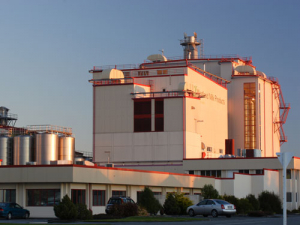Buttery prize
OPINION: Westland Milk may have won the contract to supply butter to Costco NZ but Open Country Dairy is having the last laugh when it comes to cashing in on NZ grass-fed butter.
 Gloriavale has acquired an injunction from the High Court to ensure Westland Milk continues to collect its winter milk.
Gloriavale has acquired an injunction from the High Court to ensure Westland Milk continues to collect its winter milk.
Westland Milk's decision to stop collecting milk from farms owned by reclusive Christian community Gloriavale is heading for a showdown in court.
Canaan Farming which operates Gloriavale's dairy farms, claims there's no legal ground for Westland to blacklist its top performing business.
And while the court case proceeds, Westland will continue to pick up winter milk from three farms operated by Canaan Farming.
Westland had given notice to Canaan Farming that milk collection would cease from June 13.
However, Gloriavale spokesman Stephen Standfast told Rural News that it has acquired an injunction from the High Court to ensure Westland Milk continues to collect its winter milk.
"Significant animal welfare and environmental issues would arise as a result of Westland Milk's advising of cessation of milk collection for an indefinite period," Standfast says.
A spokesperson for Westland confirmed Canaan Farming has filed and application for an interim injunction against the Hokitika-based processor.
"Westland has been advised that the injunction application will request that Westland be compelled to perform from the tersm of its milk collection contracts with Canaan, specifically to require Westland to continue to collect milk from Canaan's three farms," the company says.
"Both parties have agreed that Westland will continue to collect Canaan's milk until the Court has determined Canaan's application for an interim injunction."
Currently Canaan farming has 430 cows providing winter milk to Westland, of which 250 are autumn calvers. Another 1,500 cows will calve in spring and Standfast says planned start of calving is August 1.
He says production from the three dairy herds is 390,420 kgMS or about 480 kgMS/cow.
"One herd is a certified A2/A2 milk supplier, and the other two herds rank in close to the top 5% of the national herd for breeding worth (BW) and production worth (PW)."
Standfast points out that Canaan Farming Ltd has participated in Westland's 'FarmEx' independently audited on-farm quality assurance program since its inception and has commonly achieved either 'role model' or 'fully compliant' status in "virtually all categories".
"We seek to run our farms to a high standard and comply with all relevant legislation. This is confirmed by WMP's FarmEx program, Assure Quality audits and Ministry for Primary Industries surveillance," Standfast told Rural News.
"Canaan Farming remains committed to being transparent with our business partners and constructively resolving any issues of concern they may have."
Westland's decision to cut ties with Canaan Farms follows an Employment Court ruling that members of the West Coast-based Gloriavale community working long hours from the age of six were employees.
The ruling referred to "strenuous, difficult and sometime dangerous" work done by children.
Gloriavale is also facing action from meat companies.
The community-owned Value Proteins - an offal processing plant and pet food maker - faces losing supply of offal product from major meat processors over the same concern about its labour practices. A number of meat companies and abattoirs truck offal to the export-licenced Value Proteins plant, which turns it into high value pet and stock food.
Silver Fern Farms, Alliance and ANZCO have all indicated they are looking at terminating commercial arrangements with Value Proteins.
Changed logos on shirts otherwise it will be business as usual when Fonterra’s consumer and related businesses are expected to change hands next month.
Reflecting on the past year, Horticulture New Zealand chief executive Kate Scott says there has been a lot to celebrate.
Ministry for Primary Industries (MPI) Director General Ray Smith is giving a big shout-out to the horticulture sector, especially kiwifruit.
Early forecasts for New Zealand's apples and pears point to a standout season marked by exceptional fruit quality and high pack-out rates.
Tickets are now available for Beef + Lamb New Zealand’s (B+LNZ) Out the Gate, returning from 19-21 May 2026 at Te Pae, Christchurch.
Dairy Women's Network (DWN) is welcoming AgriHealth as a new partner.

OPINION: Here w go: the election date is set for November 7 and the politicians are out of the gate…
OPINION: ECan data was released a few days ago showing Canterbury farmers have made “giant strides on environmental performance”.